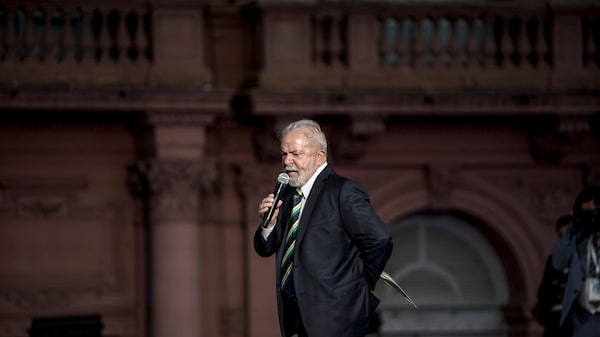Bloomberg — President Jair Bolsonaro is struggling to reverse a steep rise in fuel costs that is stoking inflation and eroding his popularity just four months ahead of Brazil’s general elections.
From lowering taxes to giving subsidies to changing the pricing policy of state-owned Petroleo Brasileiro SA (PETR4), several ideas are on the table. Most of them are unfeasible in the short term or unable to produce the desired results, or both -- such as privatizing Petrobras, as suggested by Bolsonaro in numerous occasions.

“Petrobras is extremely greedy, its profits are exaggerated,” the president said Monday during a TV interview, adding however that its privatization is very difficult. “We want to change all of Petrobras, but there’s a board meeting, a lot of bureaucracy. I hope there is no new fuel price increase until then.”
Here’s a summary of the main ideas, and whether or not they’re likely work:
Diesel Voucher
A subsidy for truckers would be a relatively easy way to provide relief and avoid the risk of another strike similar to one that paralyzed Brazil in 2018. The idea has ample backing in congress, including from lower house Speaker Arthur Lira, and the blessing of Bolsonaro’s administration as long as it doesn’t breach the government’s spending ceiling.
There is a handful of bills in congress proposing vouchers that would vary between 100-300 reais ($21-$63) per month, and establishing a deadline for the aid to run out -- some say by the end of the year, others say by the end of Russia’s invasion of Ukraine. There’s also a push to extend the benefit to taxi and ride-app drivers.
None of the bills have been scheduled to go to a vote yet as they all face the same problem: how to pay for the vouchers. One of the options is to declare a state of public calamity, similar to what was decreed during the pandemic, to suspend spending restrictions. Another is to seek a constitutional change authorizing that specific expenditure.
Tax Cap
The lower house passed a bill in late May that caps at 17% a so-called ICMS tax on fuel imposed by states and which accounts for almost a third of final prices.
Senators still need to back the bill, but even if they do so, governors will likely appeal the law in the Supreme Court, alleging it interferes with states’ autonomy. It would likely be a repeat of what happened in March when congress passed another bill changing the way ICMS is calculated on fuel only to have the measure challenged by governors in the court, which has no deadline to rule.
Fuel Fund
The senate approved a bill that creates a fund to smooth out fuel price increases in times of high volatility. The government strongly rejects the idea, and has worked with allies in the lower house to keep the proposal from moving forward there.
Petrobras’s Pricing Policy
Bolsonaro and Lira have been calling on Petrobras to fulfill its “social role” and change its policy of tracking international oil costs when pricing domestic fuel. Economy Minister Paulo Guedes has spoken about setting a 100-day window for the company to adjust prices to international levels.
Any change must be approved by the firm’s executive board -- except if the law is changed. On Tuesday, lawmakers voted to fast-track a bill that says Petrobras must use local currency to calculate production and refining costs, plus a profit index defined by oil an gas sector regulator ANP.
The bill could go to a floor vote in the coming sessions, and if passed would move on to the senate. Petrobras could challenge it in courts, but would likely have to abide by the change if it clears congress.
Changing the company’s policy of tracking international oil costs brings the risk of class action suits from investors and even intervention by Brazil’s audit court and antitrust regulator. The country’s corporate law punishes executive officers, board members and controlling shareholders if they take measures against the company’s best interest. The so-called oil bill, which states Petrobras will develop its economic activities in a free-competition environment, and a 2016 law governing state-owned firms, which establishes that practices differing from those adopted by the private sector must be clearly defined by regulation, could provide further legal protection.
Antitrust Pressure
The government also mulled using an ongoing probe by antitrust watchdog Cade to pressure Petrobras to lower prices. Cade is looking into whether the company hinders private competitors that try to use its transportation infrastructure to sell imported diesel and gasoline, newspapers reported last month.
O Estado de S. Paulo reported last week that the government and allies are considering presenting a bill that could force Transpetro, a subsidiary of Petrobras, to abide by existing rules and share its infrastructure with competitors. It’s unlikely that such a measure would have a significant impact on fuel prices.




